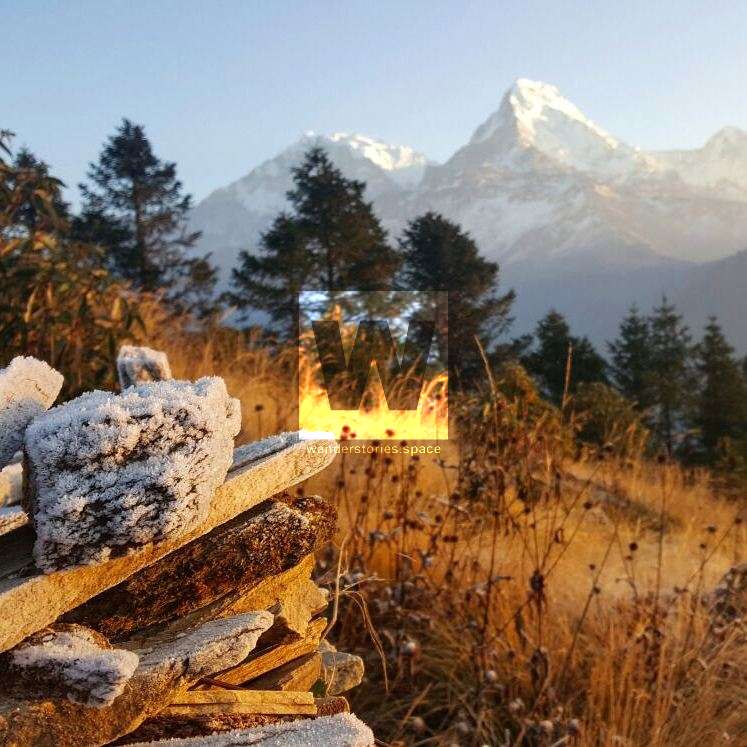Poon Hill Trek from Pokhara
Poon Hill is becoming a popular sunrise view of the snowy rugged Annapurna Himalaya range. Viewing the Himalayas close up is breathtaking.

Elevation: 3,210 m
Location: Nepal
Poon Hill is increasingly recognised for its stunning sunrise views over the Annapurna Himalaya range. The Ghorepani Poon Hill trek, a 4 to 5-day journey in the Annapurna mountains of Nepal, requires moderate fitness levels and reaches a maximum elevation of 3,210 meters, minimising the risk of altitude sickness. Pokhara serves as the most accessible starting point for treks into the Annapurna range.
Trek Permits
Two types of permits are required for the Ghorepani Poon Hill trek:
- Annapurna Conservation Permit
- TIMS Trekker's Permit
Some choose to have their guesthouses manage permit arrangements for a fee, which can save time and effort. However, a savings of approximately 500 Rupees per person is possible by organising permits independently.
Accommodation on the Trek
The Ghorepani Poon Hill trek is categorised as a "Tea House Trek." It involves moderate hiking from village to village in basic but functional lodges. These lodges often offer freshly cooked meals. Peak season may make securing accommodation more challenging, but outside of those times, lodges are generally quiet.
Drinking Water
Portable water is unavailable on the trek. Several options for drinking water include:
- Purchasing bottled water, usually priced between 80-100 Rupees for a 1-litre bottle
- Utilising water refills at many lodges and restaurants for about 60 Rupees per litre
- Employing water purification tablets, readily available across Nepal
Food on the Trek
Though food prices are notably higher in mountainous regions due to transportation costs, the fare is both hearty and fulfilling. Standard menu items include Nepali dal bhat, spaghetti, bread, omelettes, Tibetan bread, porridge, fried noodles, and fried rice, typically priced between 300-400 Rupees. Beverages like tea and coffee are about 50-60 Rupees per cup. To economise, some trekkers bring their supplies from Pokhara, including snacks and instant meals.
The Ghorepani Poon Hill Trek can be undertaken throughout the year; however, winter may present challenging trail conditions due to snow and ice.
Interactive Map
Day 1 – Nayapul to Tikhedunga
The journey begins around 8 am from Pokhara, the nearest significant town to the Annapurna Himalaya range. A taxi ride to Nayapul, costing 1,500 Nepali Rupees, serves as the starting point for the Ghorepani Poon Hill trek.
The first day of trekking is relatively easy, consisting mainly of a gradual uphill walk along a gravel road. A lunch stop at Green Land Restaurant provides the day's primary dining option, where vegetarian dal bhat—a mix of rice, dal, and vegetables—is available for 300 Rupees.
The hike resumes for a few more hours, with the gravel road eventually giving way to a more traditional trail. Upon reaching the village of Tikhedunga, travellers check into Tikhedunga Guest House. The lodge offers scenic views and the comforting sound of a distant waterfall. A double room costs a modest 350 Rupees.
Dinner options include plain white rice for 150 Rupees and stir-fried vegetable noodles for 270 Rupees. Additional food items, such as canned fish, can also be consumed if brought along. A cup of tea is available for 50 Rupees, and water refills cost 60 Rupees per litre.
The first day concludes with an early night's sleep to prepare for the next morning's Ghorepani Poon Hill trek activities.
Day 2 – Tikhedunga to Ghorepani
The day commences early, around 6 am, with breakfast. Options for budget-conscious trekkers include bringing their food items, such as muesli, to consume with water.
The trek on the second day is considerably challenging, involving a steep 4-hour ascent up the mountain face. However, the strenuous hike is rewarded with glimpses of the snow-capped Annapurna peaks.
For lunch, a small local house offers a variety of options, including sukuti (dry buffalo). Prepared with onions and spices and served with rice and dal, this dish is available for an all-you-can-eat price of 400 Rupees.
Following an hour of rest post-lunch, the trek resumes for another three hours, leading to the chilly village of Ghorepani. Accommodation at Dhaulagiri Lodge costs 300 Rupees for a room and an additional 100 Rupees for a semi-hot shower.
Upon arrival in Ghorepani, the weather quickly changes, transitioning from rain to hail. However, it clears up swiftly, offering remarkable views of the Annapurna Himalaya range.
Dinner options include vegetable fried rice for 260 Rupees and a cup of milk tea for 60 Rupees. With an early ascent to Poon Hill planned for the next day, trekkers opt for an early night's rest.
Day 3 – Ghorepani to Poon Hill, Ghorepani to Ghandruk
The day starts at 5 am to make the 45-minute ascent to Poon Hill for sunrise. The clear morning reveals majestic views of the Annapurna range, fulfilling the promise of the Ghorepani Poon Hill trek.
After descending back to the lodge for breakfast, options for frugal travellers include sticking with self-brought muesli. Water refills are priced at 60 Rupees per litre.
The trek on Day 3 is scenic, requiring frequent stops for photos and videos. The trail traverses a parallel ridge and includes a mix of downhill segments and areas covered in snow and ice, demanding slow and careful navigation.
Lunch options include another plate of vegetarian dal bhat, priced at 360 Rupees. The accompanying achar chilli sauce notably enhances the meal.
The day's trek concludes in the impressive village of Ghandruk, which offers stunning views of the Annapurna range. Accommodation at Muna Hotel is available for 350 Rupees per night.
By the end of Day 3, exhaustion sets in after approximately 10-12 hours of hiking, making early rest a welcomed necessity.
Day 4 – Ghandruk to Deurali
Day 4 begins at a leisurely pace, with the trek commencing around 8:30 am after a hearty breakfast of dal bhat (360 Rupees). The absence of refill stations in Ghandruk necessitates the purchase of bottled water, priced at 100 Rupees per litre.
The day's trail largely consists of downhill stone steps, making for a less strenuous but knee-testing journey. The trek weaves through quaint villages and small farms.
Given the ample breakfast, lunch is light with servings of muesli and assorted snacks.
By 5 pm, the group reaches Deurali, a quiet village that is merely a couple of hours away from road access, suggesting the trek could potentially be completed in just four days.
Accommodation is secured at Hotel Trekkers Inn for 350 Rupees. The establishment offers warm hospitality, including hot water showers and a comforting dinner of Tibet bread (140 Rupees) and a rice omelette (320 Rupees).
The day wraps up with an early bedtime, concluding approximately 10 hours of hiking.
Day 5 – Deurali to Pokhara (or Annapurna Eco Village)
Day 5 starts early with a filling breakfast of muesli before embarking on the final stretch of the trek. An hour's hike brings the group to Pothana, a village with road access and potential transport options back to Pokhara.
The plan is to head to Pokhara and stay in a place for 1,000 Rupees per night. Following a break for lunch featuring dal bhat and fried chicken, the Eco Village is reached by early afternoon.
Despite its picturesque surroundings, the Eco Village's stringent eco-friendly measures, like fetching your shower water, make it less appealing after five days of trekking. Consequently, a one-night stay suffices before catching a taxi back to the comforts of Pokhara.
This article, and all other articles, are for entertainment purposes only and are not to be used as a guide. Please see our Disclaimer for more information.
